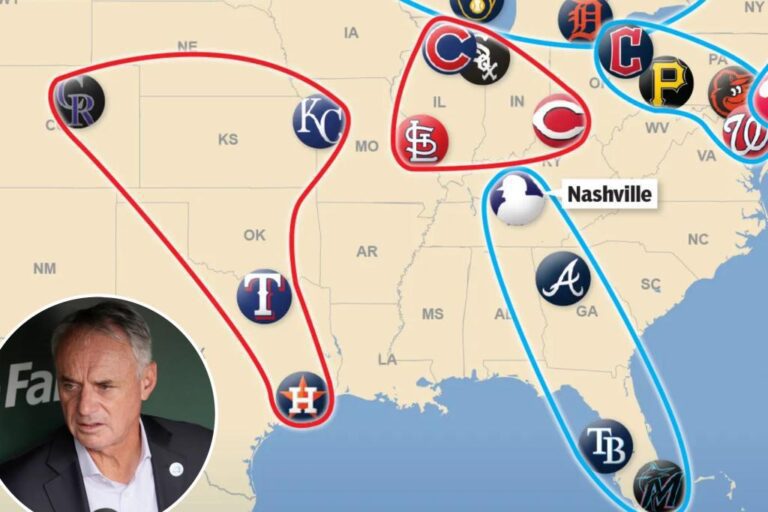MLB Realignment: A Game-Changer on the Horizon?
On Sunday night, MLB Commissioner Rob Manfred stirred the pot of baseball tradition while discussing the potential for realignment on the ESPN broadcast during the MLB Little League Classic. His comments have ignited a flurry of reactions from fans and analysts alike, as they suggest a major shake-up to the league’s long-standing structure.
The Concept of Realignment
Manfred posited that with expansion, the league could achieve geographical realignment, potentially transforming how baseball operates. He mentioned, “I think if we expand, it provides us with an opportunity to geographically realign.” This change would not only reduce player travel but also make the postseason format more enticing for broadcasters like ESPN.
Immediate Backlash
Following Manfred’s comments, traditionalists voiced their concerns:
- Howie Rose, Mets broadcaster, asserted that this could signal the end of the American League and National League as we know them. He referred to it as "the last move before total destruction of the traditions that made baseball great."
- Former MLB player Cameron Maybin echoed similar sentiments, warning that realignment could dilute division competitiveness. He tweeted, “Some divisions get watered down, others overloaded, and rivalries that drive October storylines we love vanish.”
Expansion: The First Step Toward Realignment
For realignment to happen, MLB first needs to consider expansion. Cities like Nashville, Portland, Salt Lake City, Orlando, and Charlotte have emerged as potential candidates for new teams. The challenge lies in determining how realignment will occur once these markets are added.
Potential Realignment Model
Manfred didn’t specify the exact parameters, but one could envision a two-conference system akin to those in the NBA or NHL, with 16 teams in each conference.
-
Eastern Conference:
- Teams might include the Mets, Yankees, Red Sox, Phillies, Pirates, and an expansion team in Nashville.
- Western Conference:
- The Cubs, White Sox, and teams from the West Coast like the Dodgers and Giants could be grouped together.
This reorganization could enhance rivalries and regional matchups, such as:
- Atlanta Braves vs. Nashville or Charlotte (if Charlotte enters).
- East Coast Rivalries: Yankees, Mets, Red Sox, and Phillies could form a powerful division.
Travel Considerations
Manfred’s main goal is to slash travel time for players. A division including the Mariners, Athletics, the soon-to-move Diamondbacks, and a Portland expansion team could streamline cross-country trips. However, creating efficient divisions is not a straightforward task. Historically, other sports leagues have encountered mismatches and logistical challenges in grouping teams.
Historical Context of Manfred’s Tenure
Manfred has already orchestrated several significant changes in baseball during his tenure as commissioner. However, if he moves forward with realignment, it could be his most substantial challenge yet. His tenure is expected to conclude with a planned resignation in 2029, making this initiative time-sensitive.
The Bottom Line
The prospect of MLB realignment promises to reignite discussions about the traditional structure of the game. While some hail the idea for its potential to enhance regional rivalries and reduce travel, many skeptics emphasize the need for competitive integrity. As the league navigates these transformative waters, the implications for fans, players, and the sport itself will undoubtedly be profound.
For more details on MLB realignment and its potential impacts, consider visiting ESPN and Baseball Reference for comprehensive coverage on this developing story.


